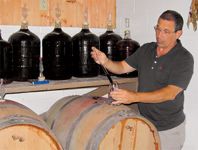Optometrist enjoys avocation as vintner
Some of the local men of Italian descent who visit Armstrong Eye Care Associates in Kittanning, PA, often bear gifts.

Key Points
Some of the local men of Italian descent who visit Armstrong Eye Care Associates in Kittanning, PA, often bear gifts. It might be fresh vegetables harvested from their garden or canned hot peppers. Their goal is to make a trade.

Since Dr. Lobby doesn't have a license to sell wine, he gives it away for free to wine connoisseurs and interested or curious patients, friends, and associates-with or without a trade. Although he's developed a local reputation over the past 30 years as an accomplished and dedicated eye doctor, it's his skill and passion for winemaking that have earned him a national reputation.

Dr. Lobby comes from a long line of Italian winemakers. When he was just a small boy, he recalls helping his grandfather make wine in his cellar. His father also made wine. So did his uncles. Since he is, as Dr. Lobby puts it, "genetically predisposed to make wine," he decided to carry on the family tradition. Today, his two grandsons help him, typically wearing purple T-shirts to hide what they spill.
While Dr. Lobby is an independent practitioner, winemaking has become a collective effort. He works with three partners-a local physician, and the chief executive officer and chief medical officer of the nearby hospital. At age 59, he is considered the senior wine-maker among them, Dr. Lobby said, adding that he encouraged his collaborators to take up this age-old profession.
Every fall, which kicks off winemaking season, they drive a truck to Pittsburgh and purchase almost four tons of grapes. They drive back to Dr. Lobby's home, crush his share of the grapes and place them in the fermentation tank. Then they all pile back into the truck with the remaining grapes and repeat the same process at each other's homes. "It's kind of like a moving, weekend party," he said. Two weeks later, they help each other move the crushed grapes from the fermentation tank into barrels.
"I use brand new oak barrels every year to make the wine taste better," he said. "There's a little bit of chemistry involved. I have to control the pH [balance] and add some sulfites as a disinfectant. I also will use a specific yeast, depending upon the wine I'm making."
Once the wine is "resting," or aging, in the barrel, his next task is patience. It takes about 2 years to make one bottle of wine.
Newsletter
Want more insights like this? Subscribe to Optometry Times and get clinical pearls and practice tips delivered straight to your inbox.